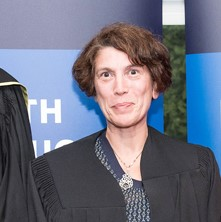
Bruyère, Helene
MD
Academic Rank(s): Clinical Professor, Pathology and Laboratory Medicine, UBC | Medical Director, VGH Cytogenetics Laboratory
Affiliation(s): VGH/VCHRI
Research and Scholarly Interests: Cancer, Genetics Genomics Proteomics and Related Approaches, Reproduction & Healthy Pregnancy, Clinical Research of Phenotype-Genotype Relationships for Chromosome Abnormalities, Clinical Genetics
Clinical Interests:
Academic Background
- MSc, University of Lyon, Biological and Medical Engineering. 1992
- Master of Biological and Medical Sciences (MSBM), University of Lyon, Hematology, Genetics and Cytogenetics Certificates. 1991
- MD, Faculty of Medicine, University of Saint-Etienne, France. 1989
Awards and Recognition
Publications
Selected Publications
Research Interest
Reproduction & Healthy Pregnancy, Clinical research of phenotype-genotype relationships for chromosome abnormalities, especially those detected prenatally, Clinical genetics
Summary: As a cytogeneticist, I am interested in understanding how rare chromosome abnormalities affect human health. Many abnormalities can be detected prenatally. When an abnormality is detected prenatally, the outcome for the child can be dramatically different from what is expected from the postnatal case descriptions. Studies of series of fetuses or newborn babies that have the same cytogenetic abnormality provide information that is irreplaceable for appropriate genetic counselling. The studies also aim to provide recommendations for cytogenetic analysis and to ensure accuracy of cytogenetic diagnosis.
Clinical Service
Current Projects In My Lab Include
- Trisomy is extremely frequent in humans at conception, affecting about 4% of clinically recognized pregnancies. Most trisomic conceptuses are lost in the first trimester. However, some trisomic pregnancies proceed to term, and one of the mechanisms thought to play a role is chromosome mosaicism. Because the distribution of the trisomic cell line typically appears random, and the clinical consequences vary from case to case, a prenatal finding of mosaicism raises counselling issues. By extensively studying cases of fetal trisomy mosaicism and reviewing the literature, we will determine whether patterns of distribution can be found that will enhance the understanding of and counselling for cases of prenatally detected trisomy mosaicism.Sex chromosome abnormalities occur in approximately 0.2% of live births. Common sex chromosome anomalies such as 45,X, 47,XXY, 47,XXX, and 47,XYY are well described and associated for the most part with predictable phenotypes. However, rare sex chromosome abnormalities often are limited to individual case reports, raising the possibility of inaccurate phenotype prediction due to biased ascertainment. An isodicentric chromosome for the short arm of the Y chromosome (idic Yp) is associated with a wide range of phenotypes in postnatally ascertained cases. It has been reported in females with either Turner syndrome or with short stature alone, children with ambiguous genitalia, boys with mental retardation and craniofacial abnormalities or short stature and incomplete masculinization, a male with short stature and schizophrenia, infertile men with short stature, and phenotypically normal males with infertility. Reports of prenatally diagnosed cases of idic Yp are rare and have limited patient follow-up. We plan to present the prenatal cytogenetic findings and postnatal outcomes of a series of idic Yp cases, to review the literature, and to provide recommendations for cytogenetic analysis and counselling.
Teaching Interest